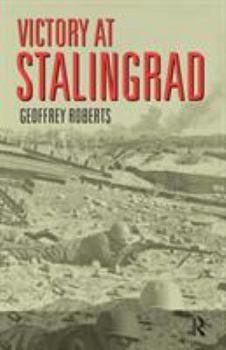Victory at Stalingrad: The Battle That Changed History
Select Format
Select Condition 
Book Overview
The battle of Stalingrad was the turning point of World War Two and one which claimed literally hundreds of thousands of lives. This new account provides a succinct and evocative narrative of its origins, course and consequences, from the outset of the Russo-German War, to the German assault on Stalingrad and the Soviet defence and counter-offensive. Geoffrey Roberts looks back at the verdict of history, arguing that not only was Stalingrad the defining battle of the World War Two, but that the Soviet victory fundamentally changed the course of human history. Convincingly argued and grippingly told, this is an accessible history by a fine author.
Format:Paperback
Language:English
ISBN:0582771854
ISBN13:9780582771857
Release Date:November 2002
Publisher:Routledge
Length:282 Pages
Weight:0.82 lbs.
Dimensions:0.8" x 5.3" x 7.8"
Customer Reviews
5 ratings
Very good
Published by Thriftbooks.com User , 19 years ago
Stalingrad enthusiasts will like this book very much, even though the true Stalingrad scholar will always favour Stopped at Stalingrad by Dr Joel Hayward and The Road to Stalingrad by Professor John Erickson. This particular book here is not as thorough or new in terms of ideas, but is the best of the smaller accessable books. It's an interesting read too. I do commend Geoffrey Roberts.
An excellent book.
Published by Thriftbooks.com User , 22 years ago
Having read two of Geoffrey Roberts' other books, I was eagerly awaiting the publication of "Victory at Stalingrad". My grandfather was killed in Stalingrad so I had a personal interest in reading about this period of the war. I was not disappointed. Roberts details the events of this amazing period of World War II with great understanding and does full justice to the true significance of the battle and the people who lost their lives.
The indispensable starting point
Published by Thriftbooks.com User , 22 years ago
Anyone interested in the history of World War II should read this book. In less than 200 pages Geoffrey Roberts analyzes the battle of Stalingrad and places it in the context of the entire war. In addition to providing a balanced, concise, and informative account of the battle and its importance, the book includes such valuable features as a chronology of the battle, 11 maps, a glossary of military terms, biographical notes on the main participants, and an invaluable guide to further reading.
This fiery trial
Published by Thriftbooks.com User , 22 years ago
Describing the American Civil war the then president described it as a fiery trial. Geoffrey Roberts has given us an account of another fiery trial. The book is an excellent read, describing not only the victory at Stalingrad but a short gripping account of the conflict on the eastern front. It is brief and to the point as well as having a factual analysis of the historical event.
Fine study of crucial victory
Published by Thriftbooks.com User , 23 years ago
Roberts aims to provide an overview of the battle of Stalingrad and its historical significance, and also to summarise, synthesise and criticise the vast literature on Stalingrad. To a remarkable extent he succeeds, although his review section is all too brief, a mere twenty pages. As he notes, Alexander Werth's superb Russia at war is still the unsurpassed account of the battle.Stalingrad was indeed the turning point of the entire war: as the American historian Stephen Ambrose wrote, "The Russians, alone, stemmed the Nazi tide, then began to roll it back." The strategic initiative passed from Hitler to the Soviet Union. The battle ended the string of Allied defeats, and opened the way for all our subsequent victories. As Roberts writes, "No battle changed history more than Stalingrad." He also shows how Stalingrad resulted from the Soviet Union's economic, political and moral superiority - "the successful mobilisation and deployment of Soviet material superiority - that was a matter of effective politics and economics."Soviet forces inflicted more than 90% of the Nazis' losses, 600 divisions, ten million casualties. President Roosevelt said, "the Russian armies are killing more Axis personnel and destroying more Axis material than all the other twenty-five United Nations put together." The Soviet Union assisted the D-Day landings by stepping up its attacks in Eastern Europe, stopping Hitler from reinforcing Normandy. As the BBC said, "But for the Russians, D-Day would have been impossible." Even after D-Day, Soviet forces were still fighting twice as many German soldiers on the Eastern front as the British and US forces were fighting on the Western front.Without Stalin, the Bolshevik Party and the Red Army, Hitler would have won the war, Britain would be enslaved, and we would be living, if at all, in concentration camps. We must never forget the huge debt that we all owe to the Soviet Union.





